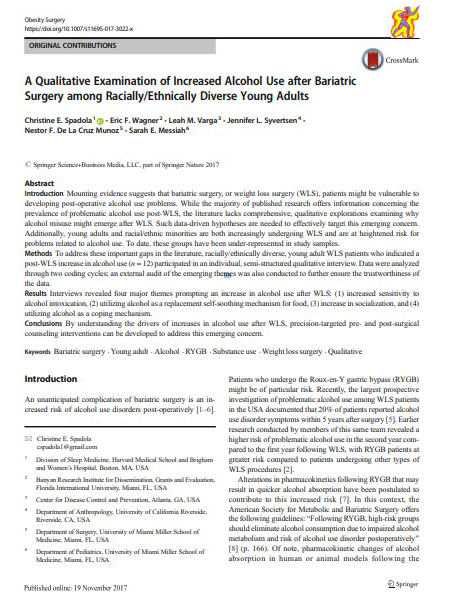A qualitative examination of increased alcohol use after bariatric surgery among racially/ethnically diverse young adults
 Abstract: Introduction – Mounting evidence suggests that bariatric surgery, or weight loss surgery (WLS), patients might be vulnerable to developing post-operative alcohol use problems. While the majority of published research offers information concerning the prevalence of problematic alcohol use post-WLS, the literature lacks comprehensive, qualitative explorations examining why alcohol misuse might emerge after WLS. Such data-driven hypotheses are needed to effectively target this emerging concern. Additionally, young adults and racial/ethnic minorities are both increasingly undergoing WLS and are at heightened risk for problems related to alcohol use. To date, these groups have been under-represented in study samples.
Abstract: Introduction – Mounting evidence suggests that bariatric surgery, or weight loss surgery (WLS), patients might be vulnerable to developing post-operative alcohol use problems. While the majority of published research offers information concerning the prevalence of problematic alcohol use post-WLS, the literature lacks comprehensive, qualitative explorations examining why alcohol misuse might emerge after WLS. Such data-driven hypotheses are needed to effectively target this emerging concern. Additionally, young adults and racial/ethnic minorities are both increasingly undergoing WLS and are at heightened risk for problems related to alcohol use. To date, these groups have been under-represented in study samples.
Methods: To address these important gaps in the literature, racially/ethnically diverse, young adult WLS patients who indicated a post-WLS increase in alcohol use (n = 12) participated in an individual, semi-structured qualitative interview. Data were analyzed through two coding cycles; an external audit of the emerging themes was also conducted to further ensure the trustworthiness of the data.
Results: Interviews revealed four major themes prompting an increase in alcohol use after WLS: (1) increased sensitivity to alcohol intoxication, (2) utilizing alcohol as a replacement self-soothing mechanism for food, (3) increase in socialization, and (4) utilizing alcohol as a coping mechanism. Conclusions By understanding the drivers of increases in alcohol use after WLS, precision-targeted pre- and post-surgical counseling interventions can be developed to address this emerging concern
Spadola, C.E., Wagner, E.F., Varga, L. M., Syvertsen, J.L., Cruz Munoz, N F., & Messiah, S.E. (2017). A qualitative examination of increased alcohol use after bariatric surgery among racially/ethnically diverse young adults. Obesity Surgery, (6), 1492. doi:10.1007/s11695-017-3022-x
